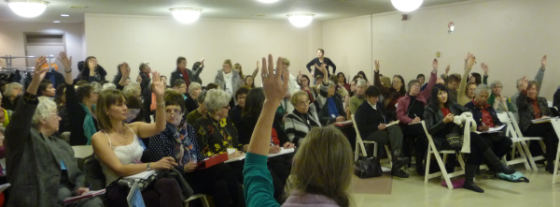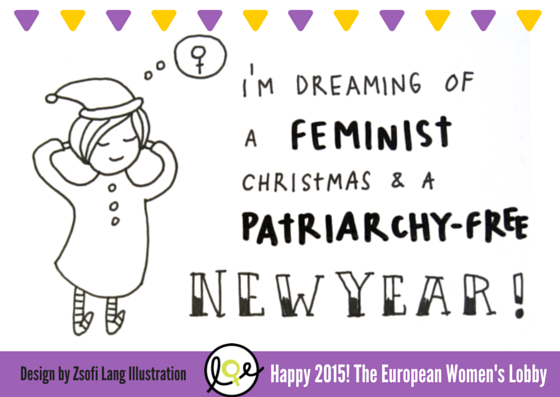[Joint statement to CSW59, 24 October 2014] Adopted two years after the Vienna World Conference on Human Rights, the Beijing Platform for Action (BPfA) brought to light the structural inequalities and human rights violations faced by all women and girls on the planet, and set the foundations for concrete action to realise de jure and de facto equality between women and men.
20 years later, much has been achieved, but much remains to be done. The European Women’s Lobby (EWL) report “From Words to Action” provides a picture of the situation of women and girls in Europe today, based on the collective assessment of its 2000 member organisations. While we should be celebrating the implementation of the BPfA, we know and see that women and girls still face inequality, violence, discrimination and insecurity, in all spheres of life and society.
Women and girls in Europe are now present in all spheres of society, from education to employment, in political and business decision-making, expressing their views as artists, journalists, researchers, or community leaders. A new generation of young feminists is mobilising widely, using new communication technologies, dynamically tackling new and old forms of violations of their rights, and building global solidarity. Events and campaigns are taking place in different countries, giving life to a renewed women’s social movement. Some men are engaging in the feminist movement, to support women’s organisations’ demands. Feminist economists are challenging the current system we live in, by proposing new ways of measuring wellbeing and protecting our planet and the next generations.
Despite this optimistic picture of a renewed feminism in Europe, women’s rights are facing a stronger backlash than ever.
Ultra-conservative and religious groups are systematically calling gender equality into question, by attacking women’s sexual and reproductive rights, sexuality education, women’s access to employment and decision-making. Some men’s groups are getting media attention to their reactionary demands for patriarchal structures. The 2014 European elections brought more populist and misogynist European parliamentarians, directly threatening EU policies for women’s rights. The myth of “equality being already there” in Europe prevents gender equality from becoming a standalone goal for the EU. The recent climate of austerity reinforces the idea that women’s rights are “the icing on the cake”. Financial cuts are threatening the very existence of women’s organisations.
Additionally, the neoliberal system and the consumer society are impacting detrimentally on women’s and girls’ empowerment, by commodifying their body and sexuality and perpetuating gender stereotypes throughout all spheres of society. Stereotypes shape toys for boys and girls, influence girls’ choices in education, prevent women from accessing some jobs, impact on women’s and girls’ health, legitimise violence and everyday sexism, convey restrictive messages about women’s role in society. We are worried to see that the cult of individualism has become so widespread that structural violations of women’s rights are not taken seriously.
In 2015, women’s organisations would expect all countries to take a step further and deliver new commitments to go beyond the BPfA. Instead, a growing profound and structural movement of antifeminist and ultraconservative ideas contests the goal of equality between women and men, develops argumentation based on religion, tradition or culture to legitimate violations of women’s rights, challenges universal human rights and the global solidarity for women’s rights.
We call on all member states to implement now the BPfA and to include the following demands of women’s organisations in their CSW and post-2015 commitments:
• Women’s and girls’ rights are universal goals, which cannot tolerate any exception, justification or excuse. Peaceful and sustainable development cannot be achieved if half the planet’s population is not fully enjoying their human rights. We need a new paradigm for human rights: human rights are about a collective vision and solidarity, not tools to promote individualism. We call on all member states to reaffirm their commitment to all interconnected and universal human rights, and systematically implement a women’s rights perspective in their work.
• The current economic, political and social system has proven to be unsustainable, dangerous for the Planet, and unable to include and protect the most vulnerable, starting with women and girls. Women’s and girls’ views must be integrated in the global conversation on the major challenges that humanity is facing: climate change and biodiversity, poverty and redistribution, trade, food and land, water and energy, inequalities and violations of human rights, militarisation and conflicts, economic and financial governance… We call on all member states to equally include women’s organisations and experts in all global discussion on all issues.
• We need a shift in the values conveyed by our economic and financial systems: from profitability to wellbeing, from competition to solidarity, from inequality to transparency. The economy must serve the wellbeing of all, and not the other way round. In the current system, women’s economic independence is not guaranteed. We are alarmed to see how the obsession of growth is prioritised over women’s rights, and unreservedly condemn the EU request to member states to include prostitution in their national statistics. Investing in women’s rights is the most urgent and smart action to protect the planet and see future generations equal, empowered, living in peace and dignity. Feminist economists are an inspiration for a radical new vision for people and planet, including of the care economy. The women’s movement is allying with other social movements to propose alternatives based on rights, solidarity and equality. We call on all member states to deliver a new model for development and peace, with women’s and girls’ rights and feminist economics and values at its core.
• Everywhere in the world, including Europe, women human rights’ defenders are being threatened and attacked. Grassroots action by women’s organisations makes a real change at all levels of personal life, community and society. We cannot accept the dismantling of civil society. We call on all member states to abide by their duty to develop democratic societies and civil dialogue, support women’s organisations and protect all human rights activists.
• Women are not a homogenous group and have multiple identities. This diversity is what makes our societies so interesting and creative. But living in systems where racism, sexism and classism are still prevalent, women with multiple identities are rendered more vulnerable to discrimination, violence and violation of their rights. The situation of migrant or undocumented women, women from ethnic minorities, indigenous women, Roma women, women with disabilities, rural women, girls, older women, lesbians and bisexual women, transgender women, has long been made invisible. We call on all member states to make sure that all policies are designed to not leave a single girl or woman behind.
• The prevalence and persistence of gender stereotypes show that the shift of mentalities remains the highest challenge for the realisation of women’s rights. Legislation should be accompanied by political will to keep women’s rights on the highest level of the political agenda, at all times. We call on all member states to elaborate comprehensive and ambitious strategies to realise women’s and girls’ rights, which should not only develop and implement legislation, but also make a concrete change in mentalities and values.
• Ending all forms of violence against women and girls should be a priority: there won’t be peace as long as women or girls live in fear of violence. There can be no excuse, custom, tradition, or religious consideration used to violate women’s rights and legitimise male violence. Violence against women cannot be considered a private issue; it is a human rights issue. We call on all member states to reiterate their commitment to end all forms of violence against women and girls.
• We call on the UN and the member states to reaffirm their commitment to existing UN agreed language and instruments on women’s rights and empowerment. We condemn the trivialisation of prostitution as ‘work’ by some UN agencies and reports, which renders invisible the structural harm of the prostitution system and its links with human trafficking; we call on member states to reaffirm their commitment to the UN 1949 New York Convention. We want to see strong international commitment to guarantee and promote women’s and girls’ sexual and reproductive health and rights, at a time of commemoration of the 20th anniversary of the Cairo Programme of Action. We condemn attacks on LGBTI persons and want to see a recognition of the diversity of families and relationships.
The EU and its member states are at a political turning point: they must choose to lead the way towards a gender equal future. Investing in women’s rights is the core commitment for a more sustainable, democratic and inclusive world to evolve. The nomination of a Commissioner for Gender Equality is an opportunity to put women’s rights at the centre of European politics; we call on her to build on the recommendations outlined in EWL Beijing+20 report to develop an ambitious new strategy for all women and girls in Europe to enjoy their full human rights. We call on all EU member states to strengthen their institutional mechanisms and commitments for women’s and girls’ rights.
- Alianza por la Solidaridad, Spain (Red Activas)
- Association for the Support of Women Candidates (KA.DER)
- Association of Organisations of Mediterranean Businesswomen (AFAEMME) (Spain)
- BPW Europe
- CBM
- Center for a Critical Conscience of Romania
- Coalition against Trafficking in Women
- Communications Coordination Committee for the United Nations (CCCUN)
- Conseil National des Femmes du Luxembourg
- Coordinadora Española para el Lobby Europeo de Mujeres (CELEM) (Spain)
- Coordination française pour le Lobby européen des femmes
- Coordination luxembourgoise pour le LEF
- Department of Gender and Sociology of the Institute of Sociology (part of the Academy of the Sciences) (Czech Republic)
- Dpto. Mujer Trabajadora UGT CONFEDERAL (Spain)
- Engender Scotland (UK)
- Equality Now
- European Center of the International Council of Women
- European Women Lawyers Association
- European Women’s Lobby
- EWL Coordination for Turkey
- Federación de Asociaciones de Mujeres Rurales (FADEMUR) (Spain)
- Federación de Mujeres Progresistas (FMP) (Spain)
- Federación de Planificación Familar Estatal (Spain)
- Federación española de mujeres directivas, ejecutivas, profesionales y empresarias
- Federation of Cale/Kale, Manouches, Romany and Sinte Women
- Femmes solidaires (France)
- FOKUS – Forum for Women and Development
- Fórum 50 % (Czech Republic)
- Hungarian Women’s Lobby
- Institute for Science and Human Values
- International Alliance of Women – IAW
- International Association of Applied Psychology
- International Council of Women
- International Federation of Business and Professional Women
- Italian Association for Women in Development – AIDOS
- Karat Coalition
- KULU-Women and Development, Denmark
- Kvinnefronten / Women’s Front (Norway)
- LEF Italia
- Medicos del Mundo España
- Mothers Legacy Project
- MujeresMundi (Belgium)
- National Alliance of Women’s Organizations (UK)
- National Council of Women Malta
- National Council of Women USA
- Nederlandstalige Vrouwenraad (Belgium)
- Netherlands Association for Women’s Interests, Women’s Work and Equal Citizenship
- Network of East-West Women, NEWW (Poland)
- NIWEP (UK)
- Nora (Czech Republic)
- Nytkis (Finland)
- Rakhaing Women Union (Myanmar)
- Romanian Women’s Lobby
- Roma Women’s Group Manushe (Czech Republic)
- Soroptimist International
- Soroptimist International of Europe
- Soroptimist International Great Britain & Ireland
- Swedish Federation of MIgrant Women’s Associations (RIFFI)
- Swedish Women’s Lobby (Sweden)
- The Grail
- Wales Assembly of Women (UK)
- WEN Wales (UK)
- Women’s Coalition (Turkey)
- Women’s Council of Denmark
- Women’s World Summit Foundation (WWSF)
- World Council for Psychotherapy
- World Federation for Mental Heath
- World Federation of Ukrainian Women’s Organizations (WFUWO)
- Young Women’s Christian Association of Europe



